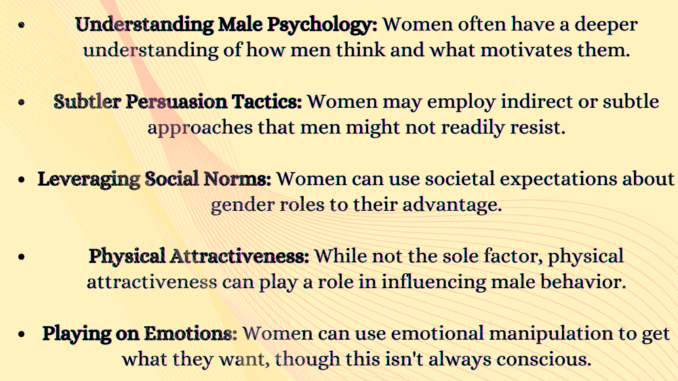
She Wants, She Gets: The Truth About Female Persuasion
The idea that women succeed in getting what they want from men can be a generalization, but there are several factors—both psychological and social—that might explain why women may be perceived as successful in this regard. It’s important to note that success in getting what one wants is not exclusive to women or men, and these dynamics can vary greatly depending on individual personalities, circumstances, and cultural contexts. Here are some reasons that might contribute to this perception:
1. Social Conditioning and Gender Roles:
- Traditional Gender Roles: In many cultures, women are socialized to be more communicative, empathetic, and emotionally intelligent. These traits can make them more effective in understanding and influencing others, including men.
- Gender Expectations: Historically, men have often been expected to provide, protect, and please women, especially in romantic or familial contexts. This can lead to situations where men are more willing to accommodate women’s desires or requests.
2. Communication Skills:
- Verbal and Non-verbal Communication: Women are often found to be more adept at expressing their needs and desires clearly and persuasively. They may also be more skilled at reading and responding to social cues, which can help them navigate interactions effectively.
- Emotional Intelligence: Women tend to score higher on measures of emotional intelligence, which involves recognizing, understanding, and managing one’s own emotions and the emotions of others. This can be a powerful tool in influencing behavior and outcomes.
3. Persuasion and Influence:
- Soft Power: Women often use what is known as “soft power,” relying on charm, negotiation, and emotional appeal rather than force or coercion. This approach can be particularly effective in personal relationships where cooperation and mutual benefit are important.
- Social Influence: Women might also leverage social connections and the desire to maintain harmony in relationships to persuade others, including men, to support their goals or desires.
4. Reciprocal Relationships:
- Mutual Benefit: In healthy relationships, both parties work to meet each other’s needs and desires. Women may succeed in getting what they want from men because they also provide something of value in return, whether it’s emotional support, companionship, or other forms of care.
- Negotiation and Compromise: Women and men often negotiate and compromise to find mutually satisfying solutions. Women may be particularly skilled at finding ways to achieve their goals while ensuring that their partners feel valued and respected.
5. Cultural Narratives and Stereotypes:
- Cultural Myths: Some cultural narratives and stereotypes portray women as being particularly adept at getting their way with men. These narratives can reinforce behaviors where both women and men play into these roles, consciously or unconsciously.
- Media Representation: Media often depicts women as using charm, wit, or other forms of persuasion to get what they want from men, which can shape societal perceptions and expectations.
6. Biological and Evolutionary Factors:
- Mate Selection: From an evolutionary standpoint, some theories suggest that women have developed skills in influencing and selecting mates as part of the natural process of securing resources, protection, and favorable conditions for raising offspring.
- Hormonal Influences: Biological factors, such as hormones, can play a role in attraction and bonding, influencing how men and women interact and what they prioritize in their relationships.
7. Mutual Attraction and Desire:
- Desire to Please: In romantic or intimate relationships, men often have a natural desire to please their partners, which can make them more likely to fulfill their partner’s wishes or requests.
- Emotional Bonding: Strong emotional bonds can motivate both men and women to go out of their way to make each other happy, leading to a dynamic where each partner is attentive to the other’s needs and desires.
Women Hold the Keys to the Male Kingdom
Ever wondered why women seem to have an edge in getting what they want from men? It’s not just luck or charm. These reasons are why women often succeed in relationships, from communication and emotional intelligence to understanding male psychology and strategic tactics.
Important Considerations:
- Individual Variation: These dynamics are not universal and can vary widely depending on individual personalities, values, and relationship dynamics.
- Equality and Respect: Healthy relationships are based on mutual respect, communication, and compromise. The idea of “getting what one wants” should ideally be balanced with the well-being and satisfaction of both partners.
The perception that women succeed in getting what they want from men often stems from a combination of social, psychological, and cultural factors. However, it’s important to recognize that relationships are complex, and success in achieving one’s goals typically involves mutual effort, understanding, and respect.


